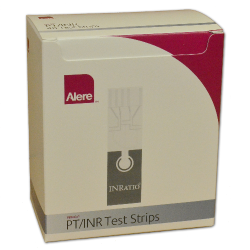 INRatio blood test monitors and testing strips produce erroneous results, according to a class action lawsuit filed last week in California federal court.
INRatio blood test monitors and testing strips produce erroneous results, according to a class action lawsuit filed last week in California federal court.
Plaintiffs Dina Andren and Sidney Bludman filed the INRatio class action lawsuit against defendants Alere Inc., Alere Home Monitoring Inc. and Alere San Diego Inc. on behalf of themselves and a Class of consumers who purchased INRatio PT/INR Monitors, INRatio TP/INR Test Strips, INRatio2 PT/INR Monitors and INRatio2 PT/INR Test Strips.
Andren and Bludman state that the International Normalized Ratio (INR) is a standardized metric used to determine how fast blood is clotting in the body. The measurement of INR is essential to ensure that a patient is receiving the proper dose of an anticoagulant, as there are major health risks associated with both high and low blood-clotting times. High blood-clotting times can lead to excessive bleeding and low blood-clotting times can lead to stroke.
According to the INRatio class action lawsuit, Alere’s INRatio products are designed to help patients who are taking prescription blood-thinners monitor their blood-clotting times to ensure they are taking the correct dosage. The INRatio monitor and blood test strips were initially developed in the late 1990s. They were approved by the U.S. Food and Drug Administration for home use in 2002.
“For patients taking blood-thinners, the ability to monitor and test their blood-clotting times and adjust their dosages accordingly is essential,” the INRatio class action lawsuit states. “Failure to take the appropriate dosage of blood-thinners can result in serious bodily injuries and death.”
However, Andren and Bludman claim the INRatio monitors and testing strips produce erroneous results. According to the INRatio class action lawsuit, the defendants received more than 18,000 complaints from users of the monitors and test strips about the erroneous results. Further, the Alere defendants reportedly received multiple warning letters from the FDA informing them that the results produced by the INRatio blood monitoring products differed from independent laboratory results.
According to the INRatio class action lawsuit, the defendants continued the marketing, advertising and sale of the products despite being aware that they failed to produce accurate results. Alere allegedly touted the INRatio products as “accurate,” “convenient,” “effective,” “reliable,” “optimal” and “safe.”
Andren and Bludman claim they relied on these representations about the products when they decided to purchase them. In May 2015, Andren reportedly relied on the results of her INRatio2 testing kit and did not take her blood-thinning medication. Later that same day, she was rushed to the hospital after suffering a stroke. She continued using the INRatio products until she was hospitalized for a mini-stroke in March 2016 and was told that the INRatio2 testing kit was the subject of a Class 1 recall.
The FDA uses the “Class 1” classification for recalls that involve products that can cause serious adverse health complications or death.
Bludman also made the decision to reduce his blood-thinning medication based on the results of his INRatio testing kit and subsequently suffered a mini-stroke, according to the INRatio class action lawsuit.
The class action lawsuit accuses the Alere defendants of violating the California Consumers Legal Remedies Act, Unfair Competition Law, fraud and unjust enrichment.
The plaintiffs are represented by Roland Tellis, Mark Pifko, and Peter Klausner of Baron & Budd PC and Timothy G. Blood and Thomas J. O’Reardon of Blood Hurst & O’Reardon LLP.
The INRatio Blood Test Strip Class Action Lawsuit is Dina Andren, et al. v. Alere Inc., et al., Case No. 16-cv-01255-GPC-NLS, in the U.S. District Court for the Southern District of California.
ATTORNEY ADVERTISING
Top Class Actions is a Proud Member of the American Bar Association
LEGAL INFORMATION IS NOT LEGAL ADVICE
Top Class Actions Legal Statement
©2008 – 2025 Top Class Actions® LLC
Various Trademarks held by their respective owners
This website is not intended for viewing or usage by European Union citizens.















One thought on INRatio Blood Test Monitors Are Defective, Class Action Alleges
Just released from hospital last night. Was hospitalized for innaccurate readings which were 7.5 on machine vs. The INR of 20.43 at hospital. I had to have brainn scan and abdominal xrays done as well as 2 plasma transfusions to bring my numbers brown